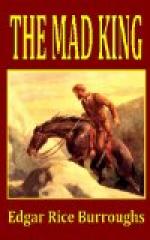Hearing nothing, he crawled at last from his hiding place with the purpose of making his way toward the south and to the frontier as rapidly as possible. He could hope only to travel by night, and he guessed that this night must be nearly spent. Stooping, he moved cautiously away from the river. Through the shadows of the wood he made his way for perhaps a hundred yards when he was suddenly confronted by a figure that stepped from behind the bole of a tree.
“Halt! Who goes there?” came the challenge.
Barney’s heart stood still. With all his care he had run straight into the arms of an Austrian sentry. To run would be to be shot. To advance would mean capture, and that too would mean death.
For the barest fraction of an instant he hesitated, and then his quick American wits came to his aid. Feigning intoxication he answered the challenge in dubious Austrian that he hoped his maudlin tongue would excuse.
“Friend,” he answered thickly. “Friend with a drink—have one?” And he staggered drunkenly forward, banking all upon the credulity and thirst of the soldier who confronted him with fixed bayonet.
That the sentry was both credulous and thirsty was evidenced by the fact that he let Barney come within reach of his gun. Instantly the drunken Austrian was transformed into a very sober and active engine of destruction. Seizing the barrel of the piece Barney jerked it to one side and toward him, and at the same instant he leaped for the throat of the sentry.
So quickly was this accomplished that the Austrian had time only for a single cry, and that was choked in his windpipe by the steel fingers of the American. Together both men fell heavily to the ground, Barney retaining his hold upon the other’s throat.
Striking and clutching at one another they fought in silence for a couple of minutes, then the soldier’s struggles began to weaken. He squirmed and gasped for breath. His mouth opened and his tongue protruded. His eyes started from their sockets. Barney closed his fingers more tightly upon the bearded throat. He rained heavy blows upon the upturned face. The beating fists of his adversary waved wildly now—the blows that reached Barney were pitifully weak. Presently they ceased. The man struggled violently for an instant, twitched spasmodically and lay still.
Barney clung to him for several minutes longer, until there was not the slightest indication of remaining life. The perpetration of the deed sickened him; but he knew that his act was warranted, for it had been either his life or the other’s. He dragged the body back to the bushes in which he had been hiding. There he stripped off the Austrian uniform, put his own clothes upon the corpse and rolled it into the river.
Dressed as an Austrian private, Barney Custer shouldered the dead soldier’s gun and walked boldly through the wood to the south. Momentarily he expected to run upon other soldiers, but though he kept straight on his way for hours he encountered none. The thin line of sentries along the river had been posted only to double the preventive measures that had been taken to keep Serbian spies either from entering or leaving the city.




